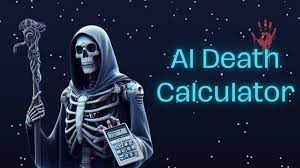When will you die? Now Easy to Know With Death AI Tool

Would you want to know when you will die? Science could be getting closer to perhaps giving you that option.
Researchers have created an artificial intelligence (AI) chatbot that can predict when you will die with 78% accuracy. Danish researchers created the life2vec machine-learning computer model, which was able to correctly predict the deaths of millions of people
Researchers at the Technical University of Denmark (DTU) have developed an AI-based death predictor, claiming high accuracy in forecasting individuals’ lifespans. Modeled after ChatGPT, the AI Life2vec system crunched personal information like age, health, education, occupation, income and other life routines for its predictions. Drawing on Denmark’s population data, the model refines its accuracy. The model was taught to assimilate information about people’s lives in sentences such as “In September 2012, Francisco received 20,000 Danish kroner as a guard at a castle in Elsinore.” Or, “During her third year at secondary boarding school, Hermione followed five elective classes,” the researchers wrote in the research paper. Analyzing health and labor market data from 2008 to 2020 involving 6 million people, the death predictor achieves a 78 percent accuracy rate.
“We use the technology behind ChatGPT (something called transformer models) to analyze human lives by representing each person as the sequence of events that happen in their life,” Sune Lehmann, lead author of the December 2023 study “Using sequence of life events to predict human lives,” told The New York Post.
“We use the fact that, in a certain sense, human lives share a similarity with language,” explained Mr Lehmann. “Just like words follow each other in sentences, events follow each other in human lives.”
“Mortality prediction is an often-used task within statistical modeling that is closely related to other health prediction tasks and therefore requires life2vec to model the progression of individual health sequences as well as labor history to predict the correct outcome successfully,” the authors of the research wrote.
Unlike ChatGPT, which focuses on crafting creative text or navigating professional hurdles, Life2vec takes a different approach. This AI delves into the personal histories of individuals, analyzing details like health, education, career, and income. Through this deep examination, Life2vec aims to predict not just career success or fashion choices but something far more profound: the very outcome of a person’s life. It’s like holding a mirror to the past, seeking to glimpse the future it reflects.
Accurately predicting death 78 percent of the time

Eventually, the AI construct was able to correctly predict those who had died by 2020 about 78% of the time, researchers say in the report.
None of the study participants were told their death predictions.
“That would be very irresponsible,” Lehmann told the New York Post
Some factors associated with earlier deaths were having a mental health diagnosis, being male, or having a skilled profession, The Science Times reported.
The program could predict personalities and decisions to make international moves, Lehmann told the Post. “This model can predict almost anything,” he said.
When can I plug my data into the doom calculator?
Not anytime soon. The program and its data are not being made public to protect the privacy of those whose information was used.
“We are actively working on ways to share some of the results more openly, but this requires further research to be done in a way that can guarantee the privacy of the people in the study,’ Lehmann told the Daily Mail.
And its predictive power might not translate beyond Denmark, Eliassi-Rad told the Northeastern Global News. “This kind of tool is like an observatory of society – and not all societies,” she said. “Whether this can be done in America is a different story.”
“Even though we’re using prediction to evaluate how good these models are, the tool shouldn’t be used for prediction on real people,” she told the university news site. Real people “have hearts and minds.”
Lehmann hopes the project will shed light on the development of AI and what should be predicted, he told the university news site.
“I don’t have those answers, but it’s high time we start the conversation because what we know is that detailed prediction about human lives is already happening,” he said. “And right now there is no conversation and it’s happening behind closed doors.”
A tough decision awaits: Will you want to know when and what you may die of?
AI’s involvement in death prediction is “the start of a very complicated road,” said Art Caplan, a professor and founding head of the division of bioethics at New York University Langone Medical Center in New York City. Other scientists are working on using blood and other physical and medical features to make predictive forecasts, too, and the insurance business is built on prediction. “What’s unique (here) is it’s using social employment and public record information, in combination with health information, to make predictions and never having met anybody in the study,” he said.
Caplan says it’s “inevitable” that consumers will be able to get information on their own forecasts. “There are going to be a lot of fights around, let’s call it ‘death prediction’ and battles over third-party access (to it),” he said.
Beyond that is a bigger issue: “These algorithms are starting to take away things we normally don’t know,” Caplan said. “It has upside and could prevent deaths, but it’s got a real existential threat of taking all the unknowns out of life, which is not necessarily a good thing.”








